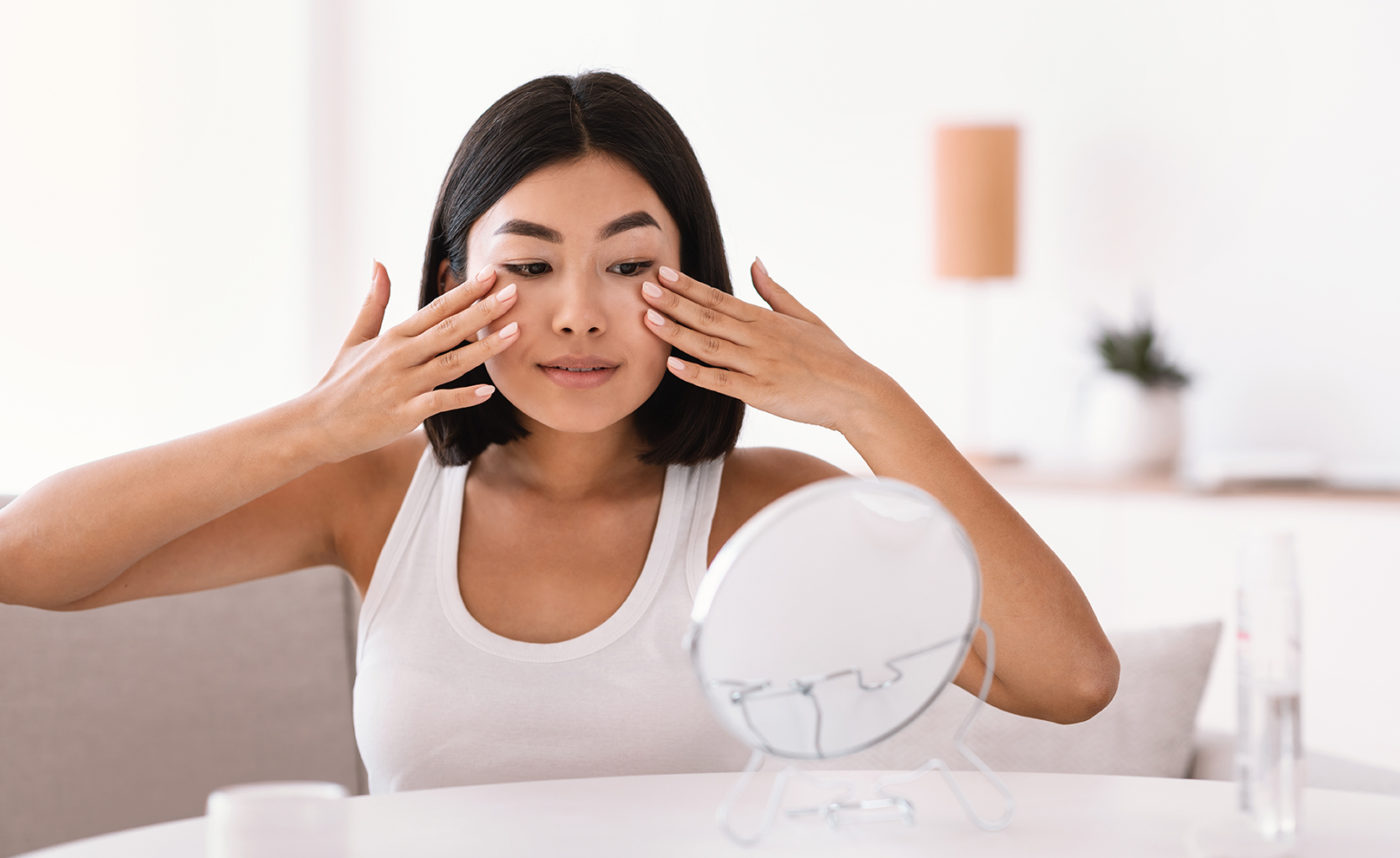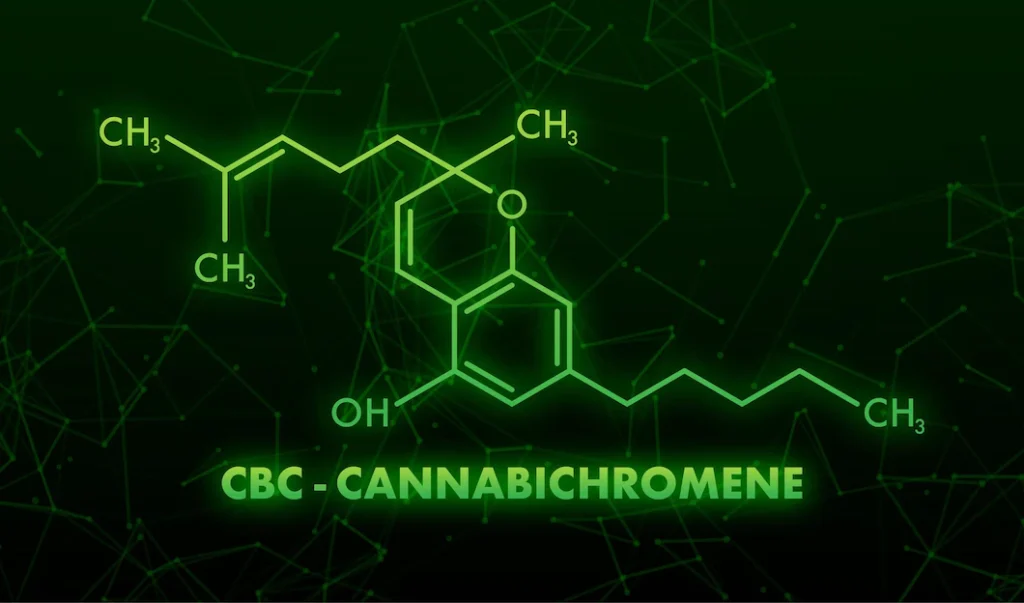
Collagen Support: Taking Control of Visible Signs of Aging
October 14, 2020
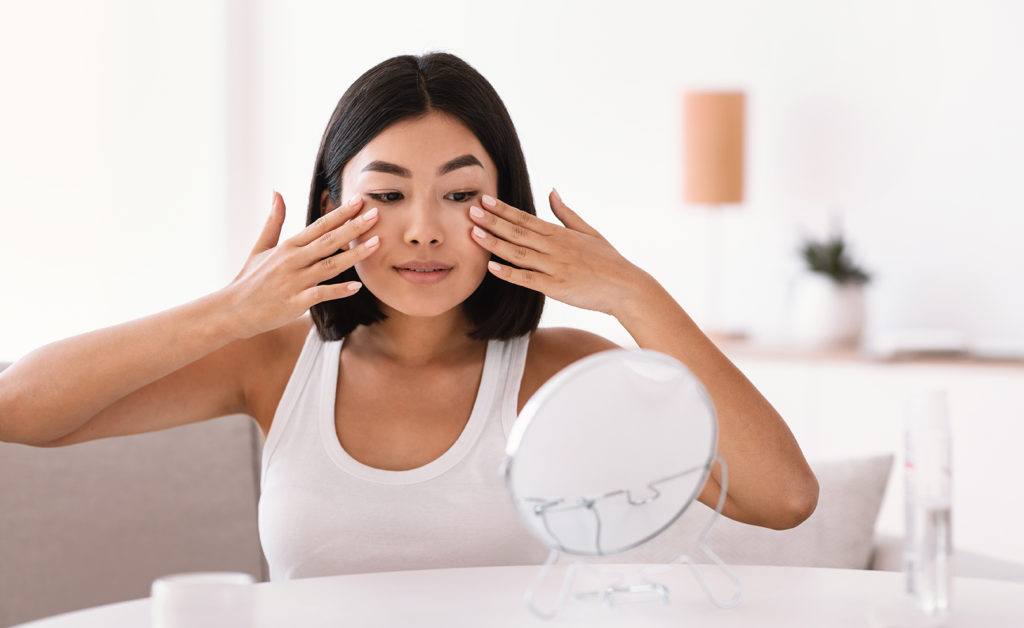
Over the last few months our posts discussed specific essential vitamins and minerals we need in order to maintain our health and allow our bodies to perform at their optimal levels. Today, we’re going to look deep into the largest organ of the human body and discuss the body’s most abundant protein, collagen. We’ll discover why collagen supplements are beneficial and what to look for when choosing a supplement.
Discovery of collagen
The word collagen comes from the Greek “Kόlla” and means “glue producer.” It refers to the process our ancient ancestors used of boiling animal parts to make glue. The Egyptians were known to use collagen adhesives 4,000 years ago and Native Americans used it in bows about 1,500 years ago. In fact, the oldest glue in the world, carbon dated as more than 8,000 years old, was found to be collagen-based and was used as a protective lining on rope baskets and fabrics, among others.1 For thousands of years, collagen was also ingested to help support the body. In Traditional Chinese Medicine, a collagen product called “Ejiao” has been used since ancient times2 to treat everything from dizziness to sleeplessness and even balance out metals, minerals, and nutrients in the blood and body. It is still widely used in these manners today.
Even though collagen has been a helpful substance for millennia, it wasn’t until the 20th century that science unlocked the mysteries surrounding collagen. Several Nobel laureate scientists were involved with the discovery of collagen and its molecular structure in the mid 1930’s. It was discovered that collagen, which is the most abundant protein found in all mammals, forms in long, fibrous, amino acid (or peptide) chains that twist around into a triple-helix structure.3
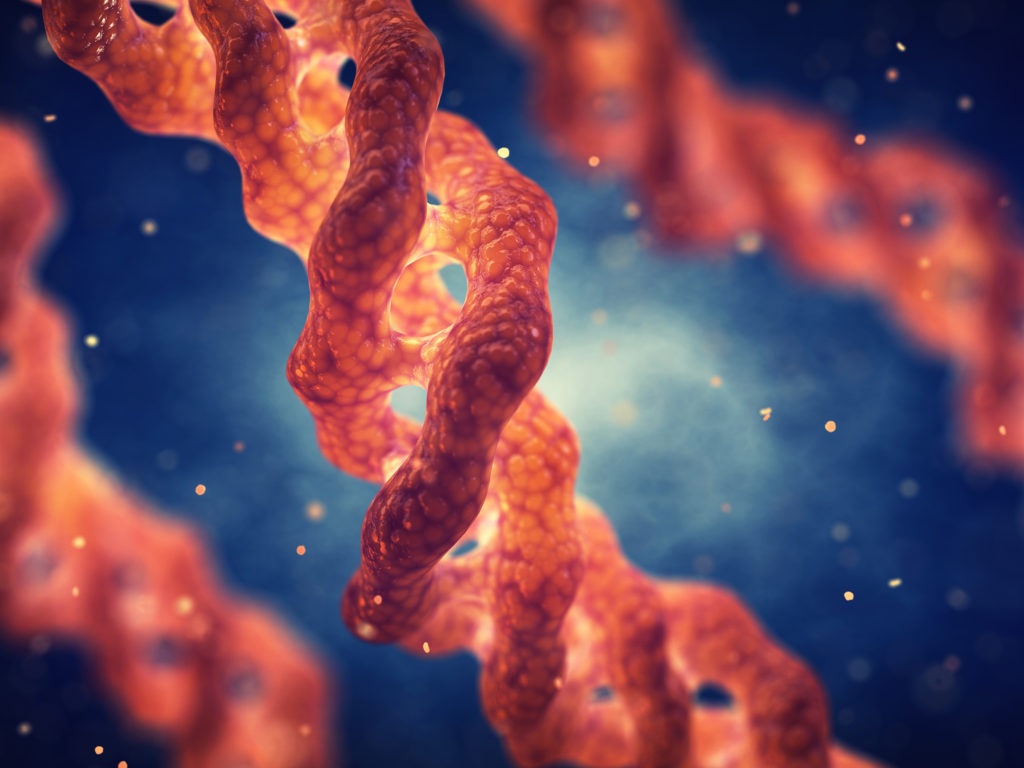
Scientists have since discovered there are many forms of collagen in the body. The most common are referred to as Type 1 and Type 2. Type 1 collagen is found predominantly in the skin, tendons, organs, and bone, while Type 2 is found mostly in the cartilage. Interestingly, there are over 20 types of collagen, but Type 1 and Type 2 appear to be the most popular forms of collagen available in dietary supplements. Although most consumers are looking for collagen of a specific type, it is important to remember that the makeup of the type of collagen is really what matters. What does that mean? Like other proteins, collagen is made up of amino acids and different collagen proteins are made up of different amino acid profiles. Amino acids are organic compounds made of oxygen, nitrogen, carbon, and hydrogen that combine to form proteins which are the building blocks of life. There are 20 amino acids that your body needs to grow and function properly. Nine of those are essential and must be obtained through supplements or food. Therefore, it is beneficial, when looking into collagen supplements, to be sure not only to pay attention to the type of collagen, but also the amino acid profiles as well. The higher the number of amino acids in the profile, the better.
What is collagen and what is it good for?
As mentioned above, collagen is the body’s most abundant protein, made up of amino acids. It is essential to our bodies as it is the “glue” that holds our bones, cartilage, skin, and blood vessels together. It’s what makes our tissues grow, mature, and move. Its presence under your skin is what supports the skin from sagging, but over time our ability to make collagen is greatly reduced. As a major component of all the soft, bendy, connective tissues in our bodies, it plays a role in strengthening and offers support in both elasticity and hydration. Collagen makes up an amazing 25% of dry mass of our body and a whopping 75% of the dry mass of our connective tissues.4 It is arguably the most important protein in our body, and we create it continuously— about 3kg (roughly 6.5 lbs.) of collagen a year.5 However, due to stress, illness, or the aging process, we produce less and less of it overtime. According to the article, “The Amazing History of Collagen” by David Hyland, after about age 25, we start synthesizing less collagen and actually start losing collagen. By the time we are about 45 years old, up to 30% of our collagen is lost.
Why should that concern you? Studies show that collagen supports flexibility and increases in joint range of motion.* An extensive study in 2018 of 60 post-menopausal women demonstrated that collagen reduced their exercise-induced joint discomfort and stiffness. Participants reported that post-exercise recovery discomfort and stiffness was reduced by 38.1%.6 In addition, a separate study published in the Journal of Arthritis in 2017 reported that collagen supplements helped relieve discomfort in participants experiencing age-related bone degeneration.*7 An earlier study in 2016 of 20 elderly participants, demonstrated that taking collagen over time improved the participants’ age-related stiffness and degeneration.*8
What is believed to be one of the largest factors as to why consumers request collagen supplements is due to its skin-supporting benefits.* Since collagen is the matrix by which your skin is supported, it has also been known to support skin health by aiding in the production of hyaluronic acid (HA).* Hyaluronic acid is one of the main hydrating compounds naturally found in the body, attracting water to skin cells but also preventing water from evaporating in the air. Collagen and HA work together to keep skin plump and firm. Changes in the skin’s structure can be a result of multiple factors such as, exposure to UV light or the natural aging process. The changes, coupled with the decrease in collagen production, changes the appearance of our skin (e.g. dryness, thinning, loss of elasticity, sagging, irregular pigmentation, or deep furrows).*
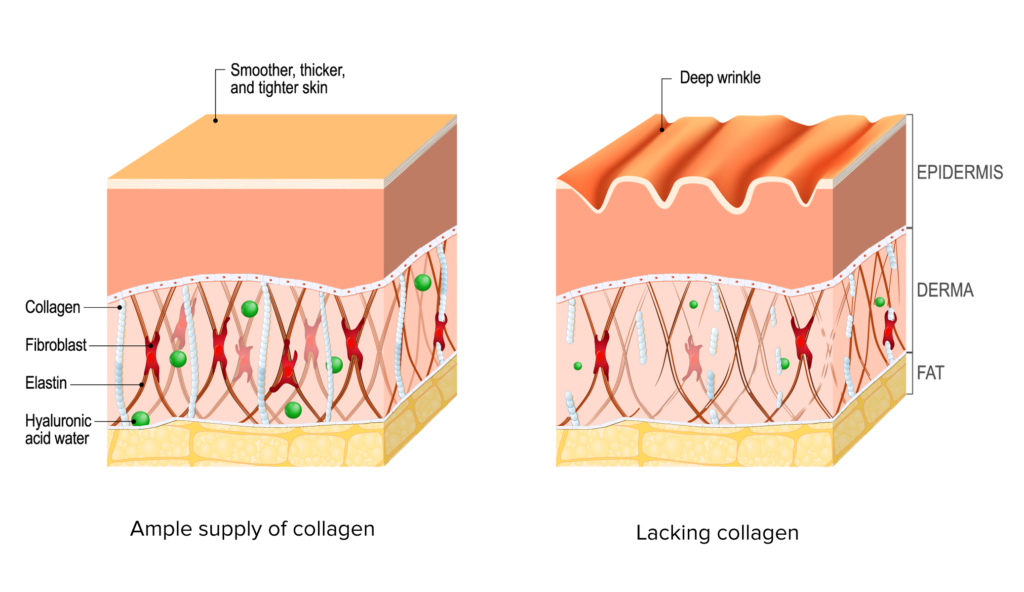
How can we get more collagen?
Invariably, we lose the ability to synthesize our own collagen overtime. Therefore, we should make sure to obtain collagen through our diet as well as dietary supplements. Collagen supplements have evolved from being sourced from strictly animals (shark fins, cow bones, chicken sternum, and fish skin) and then plants (algae, which appears to only help your body create collagen rather than provide it). Nowadays, the push for more eco-friendly and sustainable products has led to a groundbreaking way to obtain Type 1 collagen. Collagen can now be cultivated through a new source—eggshells. The membrane inside the eggshell is collagen. Since eggshells are considered a waste material that end up in landfills, using them to create collagen supplements is both environmentally friendly, sustainable, and ethically sound, unlike sources used for older collagen supplements on the market.

We also can acquire collagen by incorporating foods into our diets that support our own collagen production. Those foods include sources like cow or beef, eggs, poultry, and shellfish, but also foods high in protein like:
- Citrus fruits
- Berries
- Red or yellow vegetables
- Leafy greens
- Cashews
- Beans
- Garlic
- Bone broth
- Avocados
- Herbs high in collagen (Chinese knotweed, horsetail, gynostemma)
- Herbs that help produce collagen (gotukola, bala, ashwaganda)
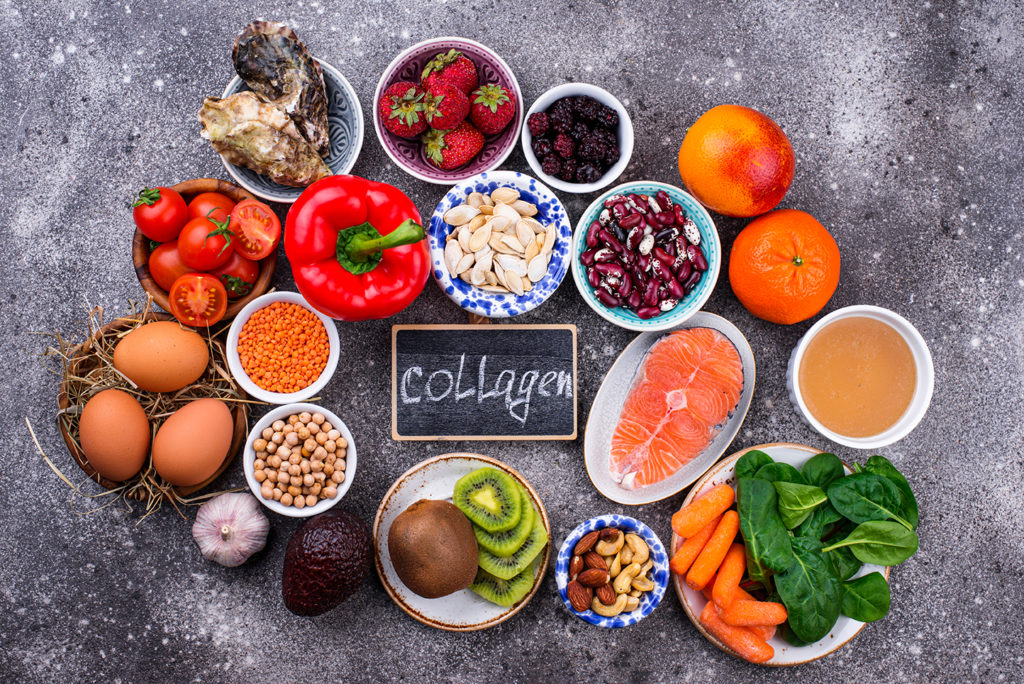
Supporting our body’s systems with collagen is a great way to maintain your overall health and wellness, in addition to supporting reduction in the external signs of aging.* When you choose a collagen supplement be on the lookout for those that are environmentally sourced, like those from eggshell membranes and those that include a more complete amino acid profile. Remember the more diverse the amino acid types, and the higher the amino acid profile, the better! You are not only supporting manufacturers who support more sustainable product sourcing, but also, getting incredible Type 1 collagen from a source that would otherwise go unused.
Check back with us next time when we introduce a brand-new section of the Discover blog! Be the first to Discover!
1 Walker, Amélie A. (May 21, 1998). “Oldest Glue Discovered”. Archaeology. Archived from the original on December 17, 2005.
2 Jing-Nuan Wu (2005), An illustrated Chinese materia medica, Oxford University Press, pp. 284–285, ISBN 978-0-19-514017-0
3 Ricard-Blum S. (2011). The collagen family. Cold Spring Harbor perspectives in biology, 3(1), a004978. https://doi.org/10.1101/cshperspect.a004978
4 Hyland, D. (2017, August 18). The Amazing History of Collagen. Retrieved September 23, 2020, from https://theredtree.co.uk/articles/the-amazing-history-of-collagen/
5 See above.
6 Ruff, K. J., Morrison, D., Duncan, S. A., Back, M., Aydogan, C., & Theodosakis, J. (2018). Beneficial effects of natural eggshell membrane versus placebo in exercise-induced joint pain, stiffness, and cartilage turnover in healthy, postmenopausal women. Clinical interventions in aging, 13, 285–295. https://doi.org/10.2147/CIA.S153782
7 T, W., L, L., N, C., P, C., K, T., & A, G. (2017). Efficacy of Oral Collagen in Joint Pain – Osteoarthritis and Rheumatoid Arthritis. Journal of Arthritis, 06(02). doi:10.4172/2167-7921.1000233
8 Blasco, J. M. I., Aguirre, A., Quintana, E. G., & Fenaux, M. (2016). The effect of daily administration of 300mg of Ovomet for treatment of arthritis in elderly patients. International Journal of Clinical Rheumatology, 11(5), 077–081.
About Zilis’ Scientific Research & Development Department
Our Scientific Research and Development Department is headed up by Dr. Marielle Weintraub, a hemp industry expert. She holds a master’s and a PhD in Behavioral Neuroscience and is very active in many dietary supplement and hemp industry trade associations, including her role as the current President of the U.S. Hemp Authority. Dr. Weintraub is committed to the continued development of hemp-specific information and testing to fulfill the Zilis mission.
Science posts for Discover are co-researched and co-written by Kelly McGill, Senior Scientific Technical Writer at Zilis. Kelly holds a bachelor’s degree in English and a master’s in Linguistics / TESL. She has been writing science-related content for over 20 years and is an expert in making difficult concepts easy to understand.
Zilis is the creator of UltraCell™, a CBD oil product derived from hemp. Based in Argyle, Texas, a suburb of Dallas-Fort Worth, Zilis is privately held. Visit zilis.com for more information.
SHARE THIS POST
ABOUT THIS BLOG
Discover : The blog with the lifestyle, nutrition, science, and history of the hemp industry.
It’s your go-to for the most up-to-date information on hemp, CBD, dietary supplements, and more! Check it out!

